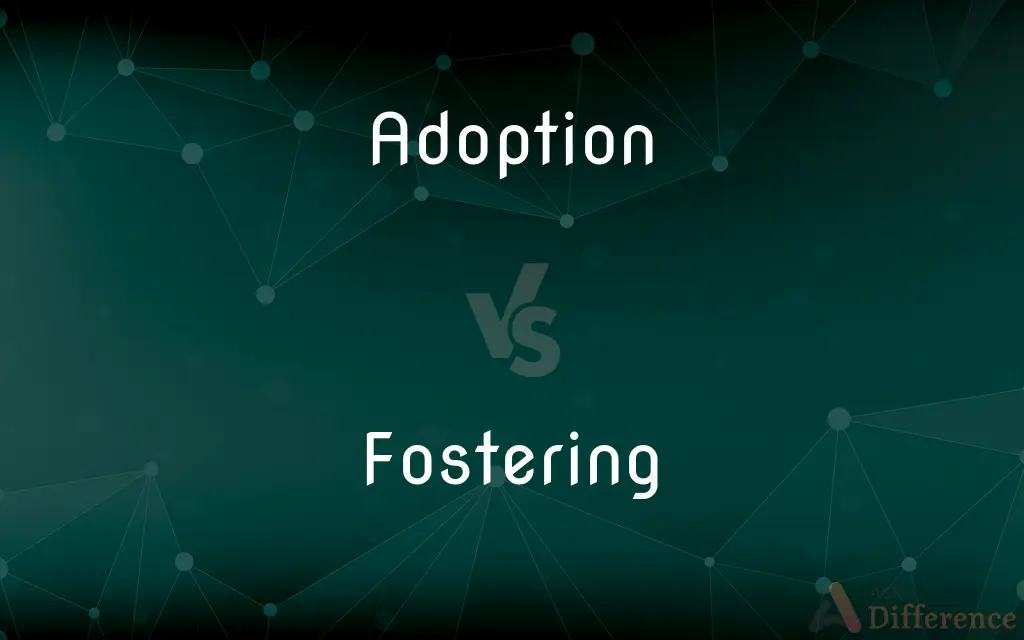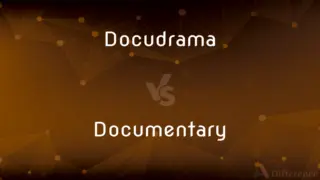Adoption vs. Fostering — What's the Difference?
By Tayyaba Rehman — Updated on September 28, 2023
Adoption is a legal process where an individual permanently assumes parenting rights for a child, while fostering is a temporary arrangement to provide care for a child in need.

Difference Between Adoption and Fostering
Table of Contents
ADVERTISEMENT
Key Differences
Adoption and fostering are both significant, yet distinct, aspects of providing care for children in need. Adoption is a legal process where an individual or a couple permanently assumes the parenting rights and responsibilities for a child, severing the legal ties with the biological parents. Adoptive parents have the same rights and responsibilities as if the child were biologically theirs, providing a permanent family for the child.
Fostering, conversely, is a temporary arrangement where a child is placed into the home of a caregiver, known as a foster parent, usually due to the inability of the biological parents to care for the child at the time. Foster parents provide a stable and supportive environment for the child but do not have permanent legal rights over them. The primary goal in fostering is usually reunification with the biological family, but other permanency plans may be pursued if reunification is not possible.
The permanency and legal implications of adoption and fostering are pivotal in distinguishing between the two. Once an adoption is finalized, the adoptive parents have permanent legal custody of the child, and the legal relationship with the biological parents is terminated. This process is irreversible, and the adopted child becomes a legal member of the adoptive family, typically taking their last name.
In contrast, fostering is inherently temporary and reversible. Foster parents do not have legal custody of the child, who remains under the guardianship of the state or a child welfare agency. Foster parents work with these agencies and the biological family to support the child's well-being and, where possible, facilitate reunification efforts. Decisions regarding the child’s welfare, education, and health are usually made by the agency, although foster parents' input is valued.
Understanding the difference between adoption and fostering is crucial for prospective parents and caregivers, as the commitment, responsibilities, and expectations associated with each vary substantially. Whether opting to adopt or foster, individuals have the opportunity to profoundly impact a child’s life, offering support, stability, and love in different but equally meaningful ways.
ADVERTISEMENT
Comparison Chart
Nature
Permanent and legal
Temporary and supportive
Legal Rights
Adoptive parents gain full legal custody and rights over the child
Foster parents do not gain legal custody or rights over the child
Parental Ties
Severs all legal ties with biological parents
Maintains legal ties with biological parents
Goal
To provide a permanent family for the child
Primarily, reunification with the biological family
Duration
Irrevocable and lifelong commitment to the child
Usually temporary, contingent on the child’s circumstances
Compare with Definitions
Adoption
A permanent arrangement providing adopted children the same legal status as biological children.
Adoption gave Sarah a chance to have a family who cherishes her.
Fostering
The practice of caring for a child whose biological parents are unable to do so, with the primary goal usually being reunification.
Fostering allows caring individuals to make positive impacts in children’s lives temporarily.
Adoption
The procedure of establishing a legal parent-child relationship between persons not biologically so.
After years of longing, the Martins found happiness in adoption.
Fostering
A temporary arrangement where a child is placed with a caregiver due to the unavailability of biological parents.
Fostering can offer support and stability to children facing familial disruptions.
Adoption
A process that legally and permanently terminates biological parents' rights, transferring them to adoptive parents.
Adoption ensures that children grow in loving and secure environments.
Fostering
A provisional solution aimed at offering a secure environment while maintaining the child’s legal ties to their biological family.
Fostering enables children to experience familial love and care during turbulent times.
Adoption
A legal process where parenting rights are permanently transferred to adoptive parents.
The Johnsons experienced immense joy after completing the adoption process for Lily.
Fostering
The act of providing temporary care and support to children in need.
By fostering, the Thompsons provided a nurturing home to several children.
Adoption
The act of assuming all rights and responsibilities of parenthood for another’s child.
Through adoption, many children find love and stability in new families.
Fostering
An arrangement where adults take on the role of temporary caregivers to children, working alongside agencies for the child’s welfare.
Through fostering, Mrs. Smith has been a beacon of hope for many children.
Adoption
Adoption is a process whereby a person assumes the parenting of another, usually a child, from that person's biological or legal parent or parents. Legal adoptions permanently transfer all rights and responsibilities, along with filiation, from the biological parent or parents.
Fostering
To bring up; nurture
Bear and foster offspring.
Adoption
To take on the legal responsibilities as parent of (a child that is not one's biological child).
Fostering
To promote the growth and development of; cultivate
Detect and foster artistic talent.
Adoption
To become the owner or caretaker of (a pet, especially one from a shelter).
Fostering
To nurse; cherish
Foster a secret hope.
Adoption
To take and follow (a course of action, for example) by choice or assent
Adopt a new technique.
Fostering
Providing parental care and nurture to children not related through legal or blood ties
Foster parents.
Foster grandparents.
A foster home.
Adoption
To take up and make one's own
Adopt a new idea.
Fostering
Receiving parental care and nurture from those not related to one through legal or blood ties
Foster children.
Adoption
To move to or resettle in (a place).
Fostering
Present participle of foster
Adoption
To take on or assume
Adopted an air of importance.
Fostering
Raising someone to be an accepted member of the community.
Adoption
To vote to accept
Adopt a resolution.
Fostering
Encouragement; aiding the development of something
Adoption
To choose as standard or required in a course
Adopt a new line of English textbooks.
Fostering
Encouragement; aiding the development of something
Adoption
The act of adopting. en
Fostering
Raising someone to be an accepted member of the community;
They debated whether nature or nurture was more important
Adoption
The state of being adopted; the acceptance of a child of other parents as if he or she were one's own child.
A Chinese baby girl was given away for adoption.
Another Chinese boy was put up for adoption.
Adoption
Admission to an institution, for example a hospital, clinic, mental asylum.
The adoption of people into hospitals or monasteries
Adoption
The choosing and making that to be one's own which originally was not so; acceptance
The adoption of opinions
The adoption of words from another language
Adoption
(computing) Transfer between an old system to another (usually better) system.
Our company is considering the adoption of a four-day week.
Adoption
(theology) An act of divine grace by which the redeemed in Christ are admitted to the privileges of the sons of God.
Adoption
Ten consecutive wins against an opponent.
Infuriated by his adoption yesterday, the chess master has resolved to study twice as long and twice as hard.
Adoption
The act of adopting, or state of being adopted; voluntary acceptance of a child of other parents to be the same as one's own child.
Adoption
Admission to a more intimate relation; reception; as, the adoption of persons into hospitals or monasteries, or of one society into another.
Adoption
The choosing and making that to be one's own which originally was not so; acceptance; as, the adoption of opinions.
Adoption
The act of accepting with approval; favorable reception;
Its adoption by society
The proposal found wide acceptance
Adoption
A legal proceeding that creates a parent-child relation between persons not related by blood; the adopted child is entitled to all privileges belonging to a natural child of the adoptive parents (including the right to inherit)
Adoption
The appropriation (of ideas or words etc) from another source;
The borrowing of ancient motifs was very apparent
Common Curiosities
Do adoptive parents have legal rights over the child?
Yes, adoptive parents have full legal rights and responsibilities for the child.
Is adoption a permanent arrangement?
Yes, adoption is a permanent legal arrangement.
Is fostering meant to be temporary?
Yes, fostering is generally a temporary arrangement with the goal of reunification with the biological family.
Do foster parents hold legal custody of the foster child?
No, foster parents do not have legal custody; the child is usually under the guardianship of the state or a child welfare agency.
Do foster parents receive support from child welfare agencies?
Yes, foster parents typically receive support and resources from child welfare agencies to assist in caring for the child.
Can adoption be reversed?
Adoption is a final and irrevocable process; it can't be reversed under normal circumstances.
Can a fostering arrangement be converted to adoption?
Yes, in some cases, fostering can lead to adoption if it’s in the best interest of the child and legal parental rights are terminated.
Is the primary goal of fostering reunification with the biological family?
Yes, the primary goal of fostering is usually to reunite the child with their biological family whenever possible.
Can fostering arrangements be extended?
Yes, fostering arrangements can be extended based on the child’s needs and circumstances.
Are there age restrictions for adopting a child?
Yes, there are typically age restrictions, and adoptive parents usually need to be at least a certain age older than the adoptee.
Are adoptive children considered legally equivalent to biological children?
Yes, once adopted, children have the same legal status and rights as biological children in the adoptive family.
Can a child be adopted by a single individual?
Yes, a single individual can adopt a child if they meet the necessary criteria and can provide a stable home.
Does adoption sever the legal relationship between the child and their biological parents?
Yes, adoption terminates all legal rights and responsibilities between the child and their biological parents.
Can foster parents adopt their foster children?
Yes, foster parents can adopt their foster children if reunification with the biological family is not possible, and parental rights are terminated.
Is consent from biological parents needed for adoption?
Generally, yes, but if the parents’ rights are terminated due to abuse or neglect, consent may not be required.
Share Your Discovery

Previous Comparison
Announcement vs. Invitation
Next Comparison
Docudrama vs. DocumentaryAuthor Spotlight
Written by
Tayyaba RehmanTayyaba Rehman is a distinguished writer, currently serving as a primary contributor to askdifference.com. As a researcher in semantics and etymology, Tayyaba's passion for the complexity of languages and their distinctions has found a perfect home on the platform. Tayyaba delves into the intricacies of language, distinguishing between commonly confused words and phrases, thereby providing clarity for readers worldwide.
















































